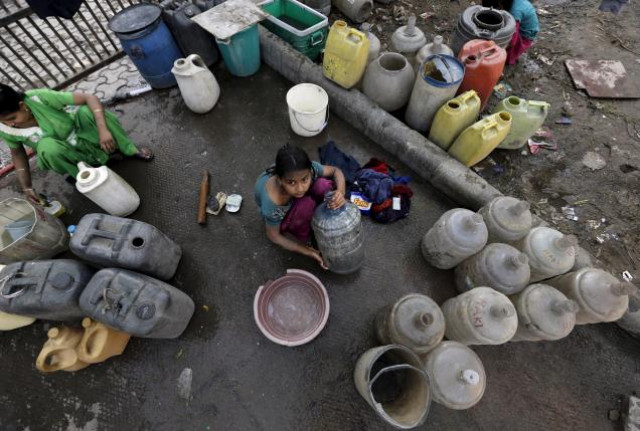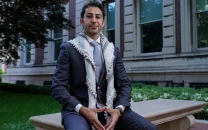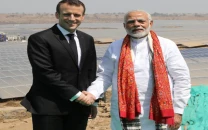India faces pressure to deliver on reforms in budget
PM Modi has made it priority to boost India's economic growth, but investors have raised concerns about pace of change

A girl waits to fill water in her containers from a municipal tap in New Delhi, India, February 21, 2016. PHOTO: REUTERS
The right-wing government's third budget has been called a "make or break" budget, coming two years into its term with its reform agenda widely seen to be stalling.
Prime Minister Narendra Modi has made it a priority to boost India's economic growth, but investors have raised concerns about the pace of change needed to boost businesses and create jobs.
Support for rural India is also likely to be a strong focus, with millions of farmers left struggling after two poor monsoons and many states suffering drought.
On Sunday Modi likened the budget to an "exam" in his monthly radio programme, which addressed students entering exam season. "I too have an exam tomorrow. The country's 1.25 billion people are going to take my examination," he said, adding that he was "full of confidence".
India is seen as a relative bright spot in the world economy, after a slowdown in China, collapsing commodity prices and recession in other big emerging markets sent stock indexes tumbling.
But with feeble global demand causing India's exports to shrink for 14 months in a row and private investment weak, the government will likely move to shore up growth at home.
Investors are looking for concrete initiatives to make it easier to do business, with hopes it will move to simplify a complex tax regime seen as off-putting to investors.
While India's Finance Minister Arun Jaitley has previously outlined his intention to reduce corporate tax from 30 to 25 per cent before the next election, Monday is expected to be the first time he lays out a detailed roadmap to reach that target.
The finance ministry has promised the 2016-17 budget will be "growth-oriented" in the face of a global climate that appears significantly more challenging than last year.
On Friday the annual pre-budget Economic Survey said gross domestic product (GDP) would expand between 7.0 per cent and 7.75 per cent in the next financial year, marking little change from this year's levels.
"If the world slows down we will slow down as well," the government's chief economic adviser, Arvind Subramanian, told a news conference.
The budget will likely set aside billions of dollars for a proposed 23 per cent pay rise for millions of civil servants and retired ones recommended by a pay commission. Other spending pledges are seen as focusing on infrastructure and recapitalising public sector banks beset by bad loans.
Investors are also expecting an announcement on how to break the impasse over Modi's flagship Goods and Services Tax (GST) which has stalled in an intensely polarised parliament.
"This year's budget... presents the (government) a chance to reset the narrative," columnist Anil Padmanabhan wrote in the Mint newspaper Monday.
A key question in economists' minds is whether the government will relax its commitment to rigorous fiscal discipline in favour of boosting spending. Many think it will soften or delay its ambitious target to cut the fiscal deficit to 3.5 per cent of GDP in 2016-2017.
India has in recent years successfully managed to narrow its high fiscal deficit — the amount by which a government's spending exceeds its income.



















COMMENTS
Comments are moderated and generally will be posted if they are on-topic and not abusive.
For more information, please see our Comments FAQ